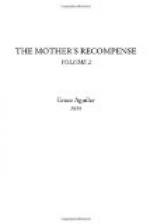“I will not come at all, if you and Edward lay your wise heads together, as you already seem inclined to do, to win me by flattery,” replied Ellen, playfully, endeavouring to look grave, though she refused not the kiss of peace for which Lilla looked up so appealingly.
The first week in July was fixed for the celebration of the two marriages in Mr. Hamilton’s family. As both Edward and Percy wished the ceremony should take place in the parish church of Oakwood, and be performed by Archdeacon Howard, it was agreed the same day should witness both bridals; and that Miss Manvers, who had been residing at Castle Terryn with the Earl and Countess St. Eval, should accompany them to Oakwood a few days previous. Young Hamilton took his bride to Paris, to which capital he had been intrusted with some government commission. It was not till the end of July he had originally intended his nuptials should take place; but he did not choose to leave England for an uncertain period without his Louisa, and consequently it was agreed their honeymoon should be passed in France. It may be well to mention here that Mr. Hamilton had effected the exchange he desired, and that Arthur Myrvin and his beloved Emmeline were now comfortably installed in the Rectory, which had been so long the residence of Mr. Howard; and that Myrvin now performed his pastoral duties in a manner that reflected happiness not only on his parishioners, but on all his friends, and enabled him to enjoy that true peace springing from a satisfied conscience. He trod in the steps of his lamented friend; he knew not himself how often his poor yet contented flock compared him in their humble cottages with Herbert, and that in their eyes he did not lose by the comparison. Some, indeed, would say, “It is all Master Herbert’s example, and the society of that sweet young creature, Miss Emmeline, that has made him what he is.” But whatever might be the reason, Arthur was universally beloved; and that the village favourite, Miss Emmeline, who had grown up amongst them from infancy, was their Rector’s wife—that she still mingled amongst them, the same gentle, loveable being she had ever been—that it was to her and not to a stranger, they were ever at liberty to seek for relief in trouble, or sympathy in joy, was indeed a source of unbounded pleasure. And Emmeline was happy, truly, gratefully happy; never did she regret the choice she had made, nor envy her family the higher stations of life it was theirs to fill. She had not a wish beyond the homes of those she loved; her husband was all in all to her, her child a treasure for which she could not be sufficiently thankful. She was still the same playful, guileless being to her family which she had ever been; but to strangers a greater degree of dignity characterised her deportment, and commanded their involuntary respect. The home of Arthur Myrvin was indeed one over which peace and love had entwined their roseate wings; a lowly yet a beauteous spot, over which the storms of the




